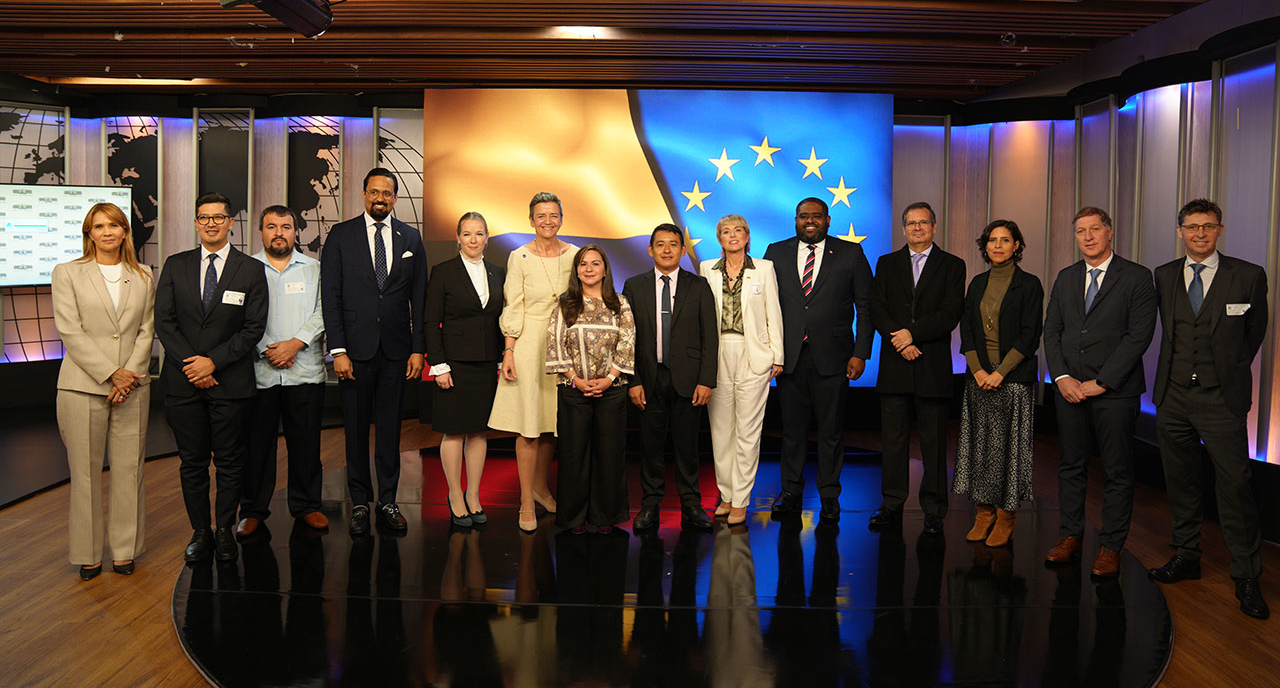The recent history of collaboration between Latin America, the Caribbean, and Europe moved a chapter forward. On 14 March in Bogotá, Colombia, the European Union-Latin America and Caribbean (EU-LAC) Digital Alliance was launched, a joint initiative that will provide a forum for regular high-level bi-regional dialogue and cooperation on digital and space topics.
The launch event was attended by high-level authorities and guests from both regions, such as the Executive Vice-President of the European Commission, Margrethe Vestager, the Vice-Minister for International Cooperation and Foreign Trade of Sweden on behalf of the Pro Tempore Presidency of the European Union, H. Diana Janse and the Minister of Information and Communication Technologies (ICT) of Colombia, Sandra Urrutia, among others. RedCLARA was represented by its Executive Director, Luis Eliécer Cadenas.
The new digital partnership was agreed upon under the Global Gateway investment strategy, a European initiative to boost cooperation links with other regions and contribute to economic and social development systems across the world. In this context, the EU-LAC Digital Alliance aims to strengthen digital areas such as infrastructure, capacity building, technology, entrepreneurship and innovation, and digitization of public services as well as Earth observation data and satellite navigation applications and services.
“Only strong partnerships and our increasing determination for joint action lead us to overcome global challenges such as inequality, conflicts, and climate change. Our expectation is EU-LAC Digital Alliance will build a joint agenda impacting positively people’s lives and countries”, remarks Margreth Vestager.
n particular, the EU-LAC Digital Alliance will support the signature initiatives of the Global Gateway investment agenda, including the BELLA II Project, led by RedCLARA, that aims to expand the new submarine connection and benefits of the BELLA Programme to more countries such as Central American and Caribbean countries. This year, the Project foresee the extension of the BELLA fibre-optic cable, building secure digital backbone connectivity and bringing the research communities of the EU and LAC closer together.
“BELLA is a notable example that shows concrete results about the European Union, Latin America, and the Caribbean can achieve together. Millions of people are already getting benefits from the digital bridge connecting these regions. For instance, thanks to BELLA the Earth observation Copernicus data will travel in seven minutes instead of one hour from European centres to Latin America. We will save time during emergencies, such as forest fires in Chile, and that will mean saving lives”, celebrated Diana Janse.
Other actions foreseen by the EU-LAC Alliance during this year include the implementation of a regional Copernicus strategy, building two Copernicus regional data centers, in Panama and Chile; and setting up an EU-LAC Digital Accelerator to foster multi-stakeholder and private sector collaboration, competitiveness, skills and innovation in the digital domain.
Earth Observation and “meaningful” connectivities panel forums
The launching ceremony was followed by a round of panels about some relevant topics, for instance, the importance of robust connectivity linking EU and ALC research processing capabilities, and Earth Observation services, which will greatly benefit from the BELLA II.
The panelists highlighted the importance of strengthening a digital value-generating ecosystem in the region facilitating the interaction of several sectors to achieve a positive economic and social impact in the region. Furthermore, speakers remark on the importance of connectivity and capacity building and the appropriation of technology at different levels.
At the end of the sessions, which were attended by the Executive Director of the Colombian NREN (RENATA), Rafael Maldonado, and the Executive Director of RedCLARA, Luis Eliécer Cadenas, the region's NRENs also celebrated the signing of a MoU that aims to boost the adoption, training, deployment and promotion of the Earth observation strategy in the region. "RedCLARA, its NRENs and Copernicus are articulating efforts to train Earth observation specialists. We will soon launch a bicontinental innovation challenge to gather ideas," explained Luis Eliecer Cadenas.
At the end of the sessions, which were attended by the Executive director of the Colombian NREN (RENATA), Rafael Maldonado, and the Executive director of RedCLARA, Luis Eliécer Cadenas, the National Research and Education Networks (NRENs) signed an agreement (MoU) to promote the adoption, training, deployment, and promotion of the Earth Observation Strategy in the region.
"RedCLARA, the member NREN, and Copernicus are articulating efforts to build Earth observation skills in specialists. We will soon launch a bicontinental innovation challenge to gather ideas," explained Luis Eliecer Cadenas.
Further information about NREN´s MoU: http://bit.ly/3lhlxI8
Further information about Digital Alliance EU-LAC, expected benefits and actions, visit: https://d4dhub.eu/es/lac
Photo: Juan Diego Cano





